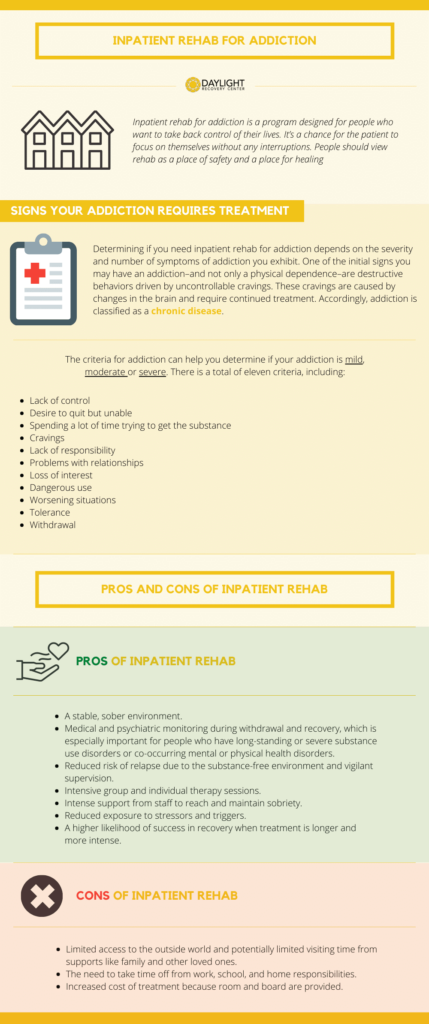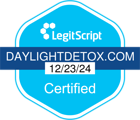Inpatient rehab for addiction is a program designed for people who want to take back control of their lives. It’s a chance for the patient to focus on themselves without any interruptions. People should view rehab as a place of safety and a place for healing – that is exactly what Daylight Recovery Center’s inpatient rehab program is, a place of serenity. We understand that when a person picks up the phone to ask for help, this is his/her “moment of clarity”. Often, something significant has occurred in one’s life to trigger a person to want to make a change. Losing a job, divorce, DUI, arrest, or losing custody of a child are just a few factors that often prompt someone who is suffering from alcoholism or drug addiction to wanting to make a change.
Participation in a structured drug rehab program is a necessary first step for many people seeking to find recovery from substance abuse. However, many addicted individuals avoid the formal care that rehab provides, preferring to try to go it alone. In reality, it is extremely difficult for many people to break free from addiction without help, especially once substance use has progressed to a certain level.

Signs your Addiction Requires Treatment
Determining if you need inpatient rehab for addiction depends on the severity and number of symptoms of addiction you exhibit. One of the initial signs you may have an addiction–and not only a physical dependence–are destructive behaviors driven by uncontrollable cravings. These cravings are caused by changes in the brain and require continued treatment. Accordingly, addiction is classified as a chronic disease.
The criteria for addiction can help you determine if your addiction is mild, moderate or severe. There is a total of eleven criteria, including:
- Lack of control
- Desire to quit but unable
- Spending a lot of time trying to get the substance
- Cravings
- Lack of responsibility
- Problems with relationships
- Loss of interest
- Dangerous use
- Worsening situations
- Tolerance
- Withdrawal
The severity is determined by how many criteria you meet. For example, if two to three of the criteria apply to you, you would have a mild substance use disorder. But even if you have a mild diagnosis, you should still seek help to get sober.
Is Detox Necessary for Inpatient Rehab for Addiction
If you need alcohol for your body to feel normal, then you likely need help. Getting through detox isn’t just a matter of willpower, and stopping “cold turkey” without at least medical help is never recommended. In some cases, withdrawal can put your life at risk. Even when it’s not as serious, it’s still a big challenge.
A program gives you support to guide you through the withdrawal. That often includes medicine to help ease symptoms as well as care for medical and mental health conditions.
Your symptoms may last a week or more, typically hitting their worst within 24-72 hours. You’re more likely to stick with a detox program when you have lots of help.
How Does Detox Work?
Detox is the first step in helping your brain and body heal from substance abuse. The detox process begins with evaluations by medical doctors and nurses to determine which, if any, medical interventions are needed. Detox is primarily a time to flush the chemicals from your body, which can be an uncomfortable experience without the right medical care to help ease discomfort and/or drug cravings. Detoxing from drugs or alcohol involves clearing the body of substances and managing any withdrawal symptoms that occur. The entire process of inpatient rehab for addiction may take anywhere from a few days to several months.
Pros and Cons of Inpatient Rehab
No single type of treatment fits everyone’s unique needs. When considering whether to attend an inpatient (also called residential) substance abuse program, consider the pros and cons.
Pros
Benefits of inpatient rehab for drug or alcohol addiction include:
- A stable, sober environment.
- Medical and psychiatric monitoring during withdrawal and recovery, which is especially important for people who have long-standing or severe substance use disorders or co-occurring mental or physical health disorders.
- Reduced risk of relapse due to the substance-free environment and vigilant supervision.
- Intensive group and individual therapy sessions.
- Intense support from staff to reach and maintain sobriety.
- Reduced exposure to stressors and triggers.
- A higher likelihood of success in recovery when treatment is longer and more intense.
Cons
Some potential drawbacks to consider before selecting an inpatient addiction treatment program include:
- Limited access to the outside world and potentially limited visiting time from supports like family and other loved ones.
- The need to take time off from work, school, and home responsibilities.
- Increased cost of treatment because room and board are provided.
What is the Difference Between Inpatient and Outpatient Rehab?
Inpatient rehabs are typically residential treatment programs where patients stay at the facility for treatment and receive specialized and intensive treatment. With outpatient treatment, participants will attend treatment sessions at a treatment center, clinic, or hospital and return home to their regular life between sessions. Those attending inpatient drug rehab usually do not leave the facility aside from special cases or situations and may be preferable for cases where: clients need monitoring for withdrawal symptoms, clients have toxic home environments and others.
What to Expect During Inpatient Rehab for Addiction
Determining if you need rehab is important for anyone who wonders whether or not they might have an addiction. Addiction is a chronic disease and, if left untreated, can destroy lives. Remember that addiction is not your fault, but getting help is your responsibility.
Inpatient rehab is the ideal choice for treating addictions, especially during the early stages of recovery. Residential rehab provides patients with 24-hour care in a safe and comfortable environment. Patients can rest easy knowing that they are never alone while they’re working towards overcoming their addiction
Usually, you can expect an Inpatient Rehab for Addiction to include these basic things:
- An intake exam so the detox team can see what kind of support you’ll need. You may get blood work, talk about your health and drinking history, and have tests to check your physical and mental health.
- Detox support, which may include medicine for withdrawal symptoms and care for other issues that come up. The goal is to help you get mentally and physically stable. You may have your temperature, blood pressure, heart rate, and breathing checked regularly during this process.
- Help getting into treatment so you can learn to break your addiction.
At Daylight Recovery Center, we believe that a successful treatment plan involves a combination of inpatient and outpatient rehab. In the early stages of treatment, we recommend inpatient rehab for our patients to receive 24/7 round the clock care.
People in inpatient rehab programs are more likely to participate in treatments such as therapy and counseling as these activities take place where the patient is staying at the time.
Insurance Options for Inpatient Rehab for Addiction
If you or a loved one is struggling with a drug or alcohol addiction there are several options for insurance that are available. Insurance is categorized as both private and public insurance plans. Both insurance types either partially or fully cover the treatment costs for every type of addiction. There are various levels of care for addiction treatment, inpatient programs as well as outpatient services.
For those trying to figure out benefits concerning drug rehabilitation programs according to individual insurance policies, a good step to take would be making contact with the insurance provider. Before making a decision on any type of treatment program, it is important to choose a drug rehab covered by the specific insurance type. Daylight Recovery Center and Recovery Center offers free insurance verifications. For a confidential call and to run your insurance benefits for drug rehab call us : [main_phone_number].



